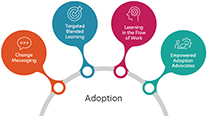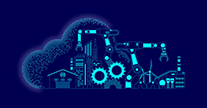Our Expertise
Transform your business
with the power of the cloud

-
Cloud transformation refers to the process of completely reimagining an organization's IT infrastructure and operations by adopting cloud computing technologies. This involves a comprehensive overhaul of the organization's technology and business processes to leverage the benefits of cloud computing. A cloud transformation often involves moving a significant portion of the organization's IT assets to the cloud, changing how IT services are delivered and consumed, and redefining the roles and responsibilities of IT teams.
Cloud transformation is a key strategy for organizations looking to take full advantage of the benefits of cloud computing and transform their IT capabilities to meet the demands of today's digital economy.
Modernize your IT and unlock the
full potential of the cloud

-
Cloud modernization, on the other hand, refers to the process of updating and optimizing an organization's existing IT systems and applications by leveraging cloud computing technologies. Modernization focuses on improving the performance, reliability, and scalability of existing IT systems by migrating them to the cloud and taking advantage of cloud-native services and tools. Cloud modernization can involve re-architecting applications to take advantage of cloud-native features, optimizing infrastructure and operations to improve efficiency, and improving security and compliance by adopting cloud-based security tools and services.
The goal of cloud modernization is to improve agility, scalability, and cost efficiency by taking advantage of the benefits of the cloud. By modernizing existing IT systems, organizations can take advantage of the latest cloud-based technologies and services to enhance their capabilities and deliver better services to customers.
Secure your journey through the clouds
with Hybrid Multi-Cloud Security

-
Hybrid multi-cloud security refers to the set of security practices, policies, and technologies that organizations use to secure their IT environments that span multiple cloud providers and on-premises infrastructure.
A hybrid multi-cloud environment typically involves a mix of private and public cloud services from different providers. This can create security challenges as organizations need to ensure that data and applications are secure across different environments with different security controls and configurations.
A hybrid multi-cloud environment typically involves a mix of private and public cloud services from different providers. This can create security challenges as organizations need to ensure that data and applications are secure across different environments with different security controls and configurations.
Empower your workforce with the
limitless possibilities of the cloud

-
User enablement with cloud refers to the set of practices, tools, and technologies that organizations use to empower their employees and customers to take full advantage of cloud computing technologies. Cloud user enablement involves providing users with the training, support, and resources they need to effectively use cloud services and applications.
Overall, user enablement with cloud is essential to unlocking the full potential of cloud computing technologies. By providing users with the training, support, and resources they need to effectively use cloud services and applications, organizations can improve productivity, innovation, and customer satisfaction.
Empower your users to take
control with cloud self-service!

-
Cloud self-service refers to the ability for users to provision and manage cloud resources and services on their own, without the need for IT or other support staff. With cloud self-service, users can easily and quickly deploy new applications, infrastructure, and services in the cloud, without the need for manual intervention or approval from IT
Cloud self-service typically involves a user-friendly interface, such as a web portal, where users can select from a pre-defined set of cloud services and configurations. This interface enables users to easily provision new resources, such as virtual machines, storage, or databases, and to configure and manage these resources according to their needs.
Effortlessly process, anytime,
anywhere with cloud automation.

-
Cloud automated processing is the use of cloud computing technology to automate the processing of data or tasks, without requiring significant manual intervention. It involves the use of specialized software and tools to create and manage workflows that can execute tasks and data processing activities automatically, based on predefined rules and conditions.
With cloud automated processing, organizations can leverage the power of cloud computing to streamline and accelerate their business processes, reduce errors, and improve overall efficiency. Some common examples of cloud automated processing include batch processing, data transformation, data validation, and data enrichment.
Cloud Services Reseller
Microsoft Partner and Microsoft Solutions

-
DE Solutions LLC proudly stands as a distinguished Microsoft Partner and esteemed Cloud Services Reseller. With an unwavering commitment to innovation and client success, DE Solutions has earned its reputation as a trusted ally in the realm of technology transformation. As a certified Microsoft Partner, they possess a deep well of expertise in harnessing the power of Microsoft's cutting-edge solutions. Moreover, their role as a Cloud Services Reseller allows them to provide tailor-made cloud-based strategies that empower businesses to optimize operations and scale with agility. DE Solutions LLC's collaboration with Microsoft not only showcases their technical prowess but also underscores their dedication to delivering top-tier, future-forward solutions to businesses, fostering growth, and driving success in an ever-evolving digital landscape.
DE Solutions LLC Microsoft Catalog <-- CLICK HERE
About DE Solutions
Executive Summary
DE Solutions is a consulting firm that specializes in Technology Management and Operations with on-premises and cloud offerings. We aim to empower businesses to modernize their IT infrastructure using an efficient convergence of emerging technologies such as DevSecOps, self-service, and automated processes. We leverage the experience and knowledge base of our team of specialists to bring seamless, secure, and more effective solutions to operations in and between organizations of varying sizes. Being a certified reseller of Microsoft and Lenovo products, DE Solutions provides customers with a comprehensive portfolio of technology solutions to cater to their individual requirements.
Through its strategic partnerships with the likes of Lenovo and Microsoft, DE Solutions offers innovative hardware and software solutions for business success. Our commitment to excellence, customer-centric ideology, and extensive experience establish us as the premier partner for companies seeking to boost their technology processes and build a competitive edge in today's increasingly digital age.
Vision Statement
Empowering businesses to achieve operational excellence and transformative growth by delivering innovative technology solutions is our vision. We aspire to be the trusted consulting partner for organizations looking to harness the full potential of their IT infrastructure, blending innovation, automation, and security to create sustainable success.
Mission Statement
Specializing in providing customized, efficient, and cost-effective solutions that enable our customers to easily adopt and merge on-premise and cloud technologies is our dedication. We at DE Solutions LLC are here to provide world-class consulting and innovative technology solutions that optimize IT operations, improve security, and align with business growth. Through DevSecOps experience, self-service automation, and partnerships with Lenovo and Microsoft, we strive to build long-term relationships with customers, enabling them to succeed in an ever-evolving digital world.
